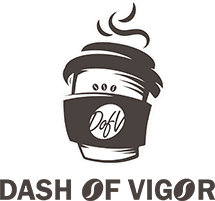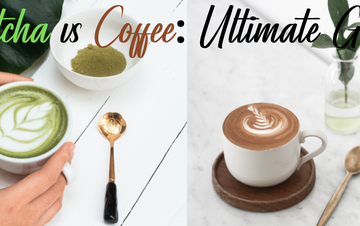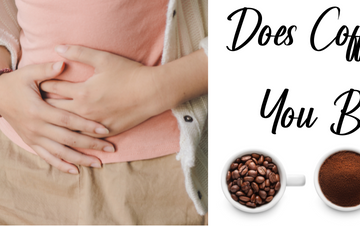Eating Coffee Beans: Weight Lost, Caffeine, is it Safe & More
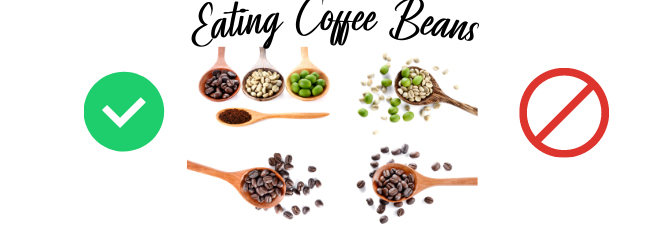
Eating coffee beans gives you more of the bean’s tremendous health advantages. When you prepare coffee, you are just steeping the bean and discarding the spent grinds (fiber) and various coffee beneficial components.
Did you know that? I didn’t before start wondering why people eat coffee beans.
You might also wonder if eating coffee grains has the same impact as drinking coffee, which has several health advantages.
Let’s see!
TABLE OF CONTENTS:
- Can You Eat Coffee Beans?
- Can you eat raw coffee beans?
- Can you eat roasted coffee beans?
- How many coffee beans can you eat in a day?
- Can you eat espresso coffee beans?
- What are the benefits of eating coffee beans?
- Coffee Beans Are the BEST Source of Antioxidants
- Improve your memory
- Decrease post-exercise muscle pain
- Increase stamina during exercise
- Coffee Beans contain caffeine
- Contain a lot of Vitamins and Minerals
- May Reduce Risk of Diabetes
- What are the side effects of eating coffee beans?
- F.A.Q.
Can You Eat Coffee Beans?
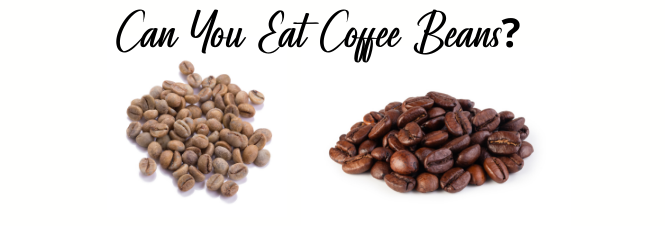
Coffee enthusiasts like me have always relished snacking on coffee beans. Eating coffee grounds has been around for a long time, long before brewing and drinking coffee became commonplace.
For example, coffee beans were once combined with animal fats and eaten as a snack to give individuals an extra surge of energy. Most people would eat these when traveling, working, or hunting.
Moreover, coffee beans (along with many other seeds) have high levels of specific chemicals, such as caffeine. As a result, moderation is crucial. For instance, caffeine sensitivity, pregnancy, or a delicate digestive system may lead some people to avoid them.
Then some prefer to chew on them or ground them up and add them to many delectable delicacies (we are talking about coffee drinkers here).
Can You Eat Raw Coffee Beans?
Roasting is supposed to eliminate any potentially hazardous components from the coffee bean. That, however, is a misunderstanding. We are not talking about eating a chicken breast that is not well prepared. Eating raw green coffee beans does not expose you to Salmonella.
The most important thing to watch out for is over-caffeinating, which may happen fast if you consume coffee beans of any type.
If you’re going to try eating fresh coffee beans for the first time, don’t expect the flavor to be as intense as roasted coffee.
You should know that green or raw coffee beans are acidic, sour, and woody.
RELATED TOPIC: What is Green Coffee Bean Extract
Can You Eat Roasted Coffee Beans?
Yes, you can eat roasted coffee beans. They are softer than regular beans.
The vast majority of coffee users prefer roasted beans. Whole beans have a rich flavor and a little gritty texture that will salivate any coffee lover. The roasting level, which ranges from light to dark, determines the focus of the flavor in the coffee.
Most consumers choose medium or darker roasts because they have more oils and richer flavors. Roasted coffee beans have a bitter taste. As a result, chocolate is the ideal accompaniment.
How Many Coffee Beans Can You Eat Per Day?
As long as you are not pregnant or caffeine-sensitive, eating 20 to 30 per day is good (in terms of caffeine). And divide it down into 7-10 beans per serving is about the same amount of caffeine as an 8-ounce cup of coffee.
Can You Eat Espresso Coffee Beans?
Yes, you certainly can eat espresso coffee beans. Above all, espresso coffee beans are regular coffee beans that have undergone one of two processes:
- Roasted to an espresso roast, generally hotter and longer than a light roast — a dark roast.
- Alternatively, a bag of beans that the roaster suggests brewing using an espresso machine to get an excellent flavor.
Again, you are probably not going to consume plain espresso beans. Instead, you will probably eat chocolate-covered espresso beans, which is delicious!
If you are searching for portion sizes, you may follow the same approach as the following paragraphs. Espresso beans may not always contain more caffeine than other types of coffee. They may have less caffeine because of their lighter roast.
What are the benefits of eating coffee beans?
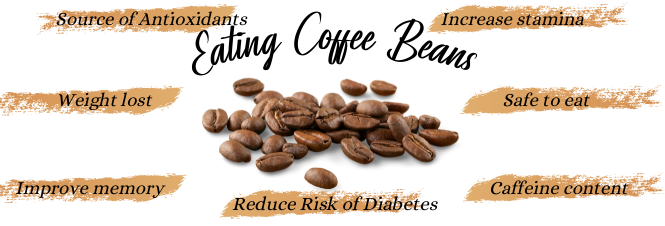
- Coffee Beans Are the Best Source of Many Antioxidants
- Improve Your Memory (Helps to Prevent Alzheimer’s)
- Decrease Post-Exercise Muscle Pain
- Increase Stamina During Exercise
- Coffee Beans Contain Caffeine
- Contain A Lot of Vitamins and Minerals
- May Reduce Risk of Diabetes
Few studies have looked into the consequences of ingesting coffee beans. Many people have researched the benefits of coffee as a beverage.
Also, eating beans will likely provide the same health advantages as drinking the cocktail.
Here are some potential pros of eating coffee beans with caffeine as a snack.
Coffee Beans Are the Best Source of Many Antioxidants
Antioxidants are naturally occurring chemicals found in fruits and vegetables.
By battling the feared free radicals, which harm our cells by oxidizing many components, they reduce our chance of cancer, eyesight loss, and other degenerative conditions. Antioxidants are vitamins E and C.
Unfortunately, many people do not consume enough antioxidants. Over 90% of Americans do not acquire the recommended daily dose of vitamin E. The average adult’s diet lacks the necessary amount of fruits and vegetables.
And here, the coffee beans are coming! They include over six different antioxidants to help you surpass the wanted limit: Cafesol, Trigonelline, Chlorogenic Acid, Melanoidins, Quinine, and Caffeine are some of the terms used to describe caffeine.
Most importantly, caffeine is an antioxidant, yes!
On the other hand, coffee is not merely a source of antioxidants. It is the most reliable source!
Improve Your Memory (Helps to Prevent Alzheimer’s)
Caffeine affects brain function, and experts have been looking for whether it helps or inhibits memory and learning retention.
Here are a few examples of scientific research that looked at the effects of coffee on memory and disorders like Alzheimer’s.
In a 2013 study by Johns Hopkins University, students took 200 mg of caffeine after a study period. Researchers discovered that coffee helped pupils consolidate memories for up to 24 hours after ingestion, ”reducing forgetting,” as one researcher described it.
The good thing is that there is some excellent news for you.
The dose of 200 milligrams is the same as the regular daily consumption!
Decrease Post-Exercise Muscle Pain
Caffeine’s pain-relieving properties have long been recognized and studied. Caffeine is, in fact, one of the primary chemicals in pain medications like Excedrin and Anacin. Caffeine can be a fantastic pain reliever when used occasionally. However, ingesting it daily and suddenly stopping might result in headaches and muscle discomfort. According to 2017 research, Caffeine reduced post-exercise muscular discomfort by 48%.
In contrast, the active ingredient in Aleve reduced pain by 30%, but aspirin only reduced pain by 25%. According to a study of distance bikers, 400 mg of Caffeine before exercise may still benefit habitual coffee consumers. That is almost double the daily intake of the average adult.
Increase Stamina During Exercise
Black coffee is a popular natural energy enhancer among athletes. The impact of coffee consumption before endurance training was explored in a research published in the International Journal of Sports Nutrition and Exercise Metabolism (running and cycling). Athletes were capable of improving their stamina and performance in five of the nine studies.
Caffeine may help reduce perceived effort and make breathing easy, allowing you to run faster. As a result, black coffee can help you perform better before training. However, there is no conclusive evidence that caffeine improves muscular strength.
So, how many cups of coffee should you consume before running or exercising?
Before working out, one espresso or a cup of black coffee will be enough to boost your performance. You should not have more than three espressos each day in total. Most importantly, excessive quantities might be harmful to health.
Coffee Beans Contain Caffeine
We can find caffeine throughout the coffee plant. The coffee beans kept within the coffee cherry fruit have the highest concentration. Even though there are over 100 kinds of coffee plants, only two cultivars account for approximately 98% of all coffee produced globally.
Arabica and robusta are the best coffee beans to eat. Although these two kinds of coffee beans are the most popular among humans, they are vastly different. One of the numerous distinctions is the quantity of caffeine present in the beans.
Contain A Lot of Vitamins and Minerals
According to the Coffee and Health organization, the nutrients present in coffee beans are also part of the finished brew. Vitamins and minerals such as riboflavin, B3, B5, manganese, potassium, and magnesium are essential.
If you drink it black, it lacks lipids, carbs, and proteins. One cup of coffee contains 6% of the RDA for pantothenic acid (vitamin B5).
- Riboflavin accounts for 11% of the RDA (vitamin B2)
- Niacin (B3) and thiamine (B1) make up 2% of the RDA (B1)
- For potassium and manganese, 3% of the RDA is sufficient.
It may not seem like much, but it quickly adds up if you drink several cups of coffee daily.
May Reduce Risk of Diabetes
Type 2 diabetes is a complex health problem affecting millions worldwide. Insulin resistance or a decreased capacity to produce insulin causes elevated blood sugar levels.
Coffee consumers, for whatever reason, have a lower chance of developing type 2 diabetes. According to research, those who drink the most coffee have a 23–50% lower risk of acquiring this illness. This is around 3-4 cups of coffee daily.
As reported by one investigation, the reduction was as high as 67%. Each daily cup of coffee was related to a 7% lower risk of type 2 diabetes, according to a general evaluation of 18 research including a total of 457,922 participants.
What are the side effects of eating coffee beans?
Consumption of the beans, as well as the beverage made from them, may have detrimental implications. Because more acid and caffeine stay in the bean when eaten directly, some of the listed below have worse impacts that may exacerbate. The key to success is moderation. When we surpass the recommended daily caffeine limit (400 mg), the following side effects are most typical:
- Problems with sleep
- Heartburn
- Anxiety/nervousness (probable tremors)
- Digestive issues (pain, possible diarrhea)
Unless you have a sensitive stomach or are caffeine sensitive, staying within recommended levels (see advised serving size earlier in this piece) should not create any issues.
F.A.Q.
Is it safe to eat coffee beans?
It is safe to eat coffee beans! But you have to be careful not to overdo their consumption. They contain a variety of minerals, as well as caffeine and antioxidants. Eating coffee beans will boost your energy and lower the risk of some diseases.
What happens if you just eat coffee beans?
Eating coffee beans can help you with your health, but exceeding their consumption will lead to several problems:
- Stomach upset because of the caffeine content and its compounds;
- Problems with sleep
- Heartburn
- Anxiety/nervousness (probable tremors)
- Digestive issues (pain, possible diarrhea)
- Risk of pregnancy problems (miscarriage, early labor, and low birth weight)
FINAL WORDS
While modest amounts of coffee are beneficial, excessive use can be hazardous.
Keep in mind that some of the evidence is not conclusive. Much of the research mentioned above was observational. Such studies can only establish a link, not prove that coffee was the source of the advantages.
Caffeine in coffee beans improves workout endurance, a quicker metabolism, and fat burning. Therefore, eating coffee beans for weight loss is essential.
If you want to optimize the health benefits of coffee, do not add sugar to it. If coffee interferes with your sleep, avoid it after 2 p.m.
In the end, though, one fact remains: coffee may be the healthiest beverage in the world.
